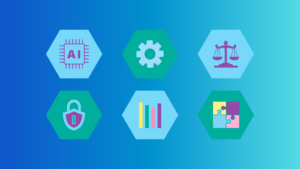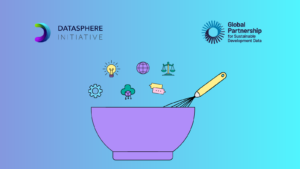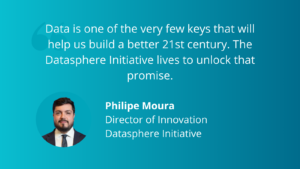The Datasphere Initiative will welcome the second cohort of fellows for the year 2022-2023.
The Datasphere Fellowship is a structured international multi-disciplinary mentorship and peer-learning program where selected graduate students and young professionals work on novel research and dialogue related to data governance.
Carolina Rossini, Director of Research and Partnerships, and who coordinates the program, commented:
“We are very much looking forward to this new year’s cohort and to the excellent production foreseen. We believe it is crucial to empower new voices and build an expert community to discover new agile frameworks to leverage data for good and build collaboratively governed the Datasphere.”
Building on the experience of the first cohort of Datasphere Fellows (2021-2022), the Datasphere Initiative has selected seven fellows and two senior fellows that will receive mentorship from the Datasphere Team and partners around the globe to think critically and develop research and solutions outputs for pressing challenges related to data governance and the Sustainable Development Goals (SDGs).
Arindrajit Basu, from India, plans to study the impact of the 2018 data localization directive of the Reserve Bank of India by producing an evidence-based assessment of data localization directives and evaluating its impact on businesses, data centers and other stakeholders. This will be done through a series of interviews with key stakeholders from the private sector and data centers. The results of the case study will inform policymakers, and industry players, not only from India but from other countries and regions where emerging economies are attempting to implement data localization directives. The research could also impact how policymakers design domestic laws, ongoing digital trade negotiations and the strategies deployed by businesses to deal with cross-border flows.
Brian Tshuma, from Zimbabwe, aims to empower individuals and local communities rights and interests in their data. He seeks to make more and more data available for business innovations needed to produce goods and services that drive economic growth. He will explore data governance models focused on data institutions that steward data on behalf of others for public, charitable or educational purposes. By engaging communities in co-inquiry processes and through mixed non-probability techniques, Tshuma expects to capture the complexities, richness and diversity of subjects’ experiences around data governance and institutions to enrich the debate, especially in Africa.
Francesa De Chiara, from Italy, seeks to test how the new regulations in the European Union affect all types of stakeholders. Her goal is to understand which data governance frameworks allow for agile sharing of data, but at the same time guarantee citizens’ rights, data sovereignty and fairness. Through methods from the social sciences – namely, interviews and focus groups with users such as policymakers, private entrepreneurs and CSOs – she will research current data-sharing models and governance frameworks to support policymakers in the EU.
Gabriel Araújo Souto, from Brazil, plans to analyze the causes of low data governance boards in Latin America. Through an extensive literature review, interviews and conceptual modeling through output-oriented Data Envelopment Analysis (DEA), he seeks to study law enforcement and the costs of data governance boards in the region. He seeks to also correlate Mercosur data governance indexes with other indexes around the world, explain the efficiency and impact of data governance boards on data protection and privacy over time, and propose solutions for the expansion of data governance boards in countries with similar socioeconomic developments to Mercosur countries.
Laura Amanda Rose Sandor, from France, plans to use the COVID-19 pandemic as a case study, to emphasize the benefits that cross-border flows can have globally within healthcare, using a mixture of a systematic review and meta-analysis. Her goal is to produce an evidence-based analysis of current data localization policies within healthcare and recommend future changes that would empower policymakers in their decision-making and lead to increased innovation in global health sciences.
Lukman Ismaila, from Nigeria, seeks to review the current medical data policy for scientific research and promote the accessibility of pan-African medical data for research purposes. He expects to propose an open-source license and standards for medical data research and a monitoring institution to track patient consent and approval.
Shreyansh Singh, from India, seeks to highlight the problems caused by government interventions in the digital space and their impact on framing the debate around data sovereignty vs. free flows of data. The research will, first, create a regulatory handbook to understand data and internet governance trends in the South Asia region. The analysis of these regulations will focus on how they could potentially violate international economic law frameworks. Second, the research will end in the production of a paper on 2-3 multi-jurisdictional legal analyses of contemporary approaches to digital governance, including the pros and cons of each governance model. The methodology will rely mainly on legal analysis of primary sources of law and judicial precedents.
The Datasphere Fellowship aims also to build a dedicated community for research and practice on data governance by serving as a platform to support Fellows and the previous cohorts of Fellows throughout their careers and the development of research agendas.
The Fellowship is an integral part of the activities of the Datasphere Initiative and is designed to complement other projects and programs of the organization. Therefore, fellows will have access to the Datasphere Initiative’s network of policymakers, company leaders, practitioners and academics that will be leveraged to inform ongoing discussions and research projects. They will also have access to Datasphere Initiative’s content distribution channels to publish their own research when related to the issues above and align with the Datasphere Initiative’s vision and mission. On an opportunity basis, they will be able to join global events or receive our support in organizing their own event. Content and tools generated by the Fellows will be documented and shared broadly to contribute to evidence-based policymaking and identify innovative solutions for global data challenges.
Read about the outcomes from the Datasphere Initiative’s first cohort of Fellows here.











